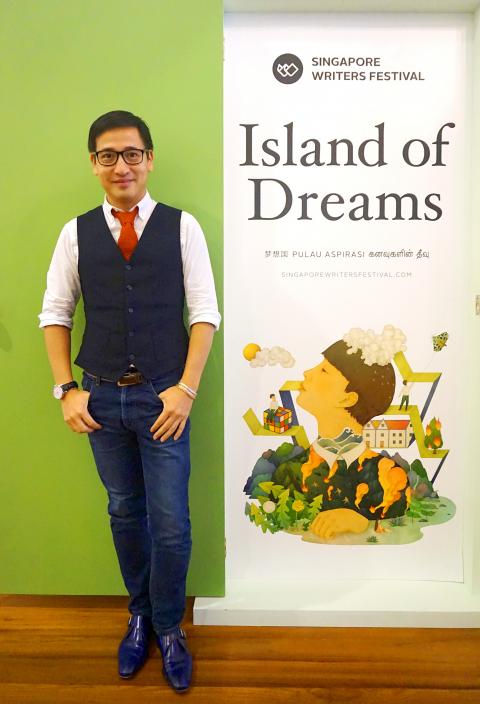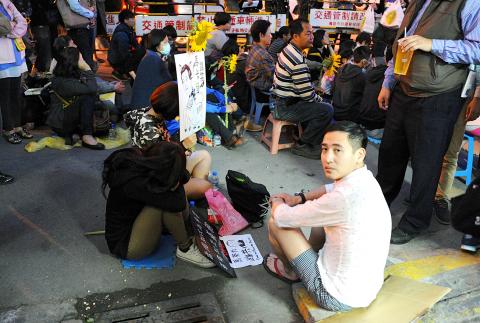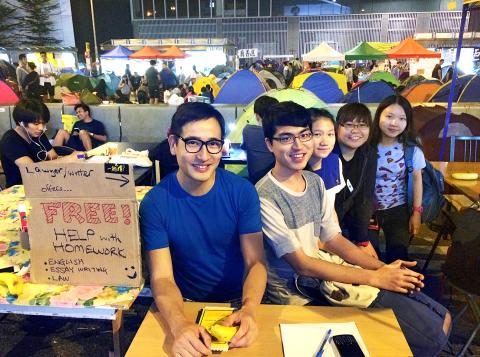It was the day after the Ma-Xi meeting — the historic meeting in Singapore between Taiwanese President Ma Ying-jeou (馬英九) and Chinese President Xi Jinping (習近平) and the first time that the top leaders from both sides of the Taiwan Strait have met in person — that I spoke with Hong Kong activist Jason Ng. The lawyer-turned-best-selling-author was signing books at the Arts House in Singapore where he was a featured speaker at the Singapore Writers Festival.
“In Hong Kong, the media calls it the Xi-Ma meeting,” Ng tells me.
Donning thick-rimmed glasses and a form-fitting navy blue vest over a neatly-pressed shirt and red tie, Ng’s soft-spoken, scholarly demeanor belies the fact that he’s one of Hong Kong’s most outspoken activists. In addition to being chosen as Hong Kong’s “Man of the Year” by Elle Men magazine in 2011 and participating in the “Umbrella movement” last year, Ng is also a columnist for the South China Morning Post and the author of the popular blog, As I See It, where he muses about Hong Kong’s most pressing social and political issues.

Photo: Dana Ter, Taipei Times
Ng says that the label, “Xi-Ma meeting,” is an indication of the amount of influence that China has come to exert over the media in Hong Kong. He adds that the perceived lack of a reliable press — especially the Chinese-language press — has led many Hong Kong residents to turn to blogs and social media for other perspectives on politics and current affairs.
BATTLE OF THE WITS, SORT OF
Earlier that day, Ng had spoken about citizen journalism at a panel discussion at the Singapore Writers Festival entitled “Tweet for Change,” which touched upon different ways that authors and journalists can use social media effectively. While he largely applauds social media for having the power to reach a mass audience in a shorter amount of time — he admits that his own blog has a wider readership than his articles because blogging is faster and more up-to-date — there’s still much to be wary of.

Photo courtesy of Jason Ng
Like the other panelists — also best-selling authors all of whom maintain a strong online presence — Ng believes that 140-character tweets and powerful images on Instagram have only fed into people’s short attention spans more.
“The problem is that whoever has a wittier phrase wins because someone who actually has a point to make may not be as creative,” he says.
Although it’s arguable that social media helped to rally support for social movements such as the “Umbrella movement,” Ng is skeptical of how much tangible progress is made when people are simply sitting at home and typing a few words or changing their profile pictures on Facebook.

Photo courtesy of Jason Ng
Then, there’s a new crop of commentators who keep the snide remarks rolling.
“The political environment in Hong Kong is so toxic these days, that after I post something, there will be a response after 10 seconds — it’s like, did you even read the article?” Ng says, to which the audience snickers.
THE TAIWAN CONNECTION
Speaking with Ng in person, he expresses a deep concern about the future of Hong Kong’s democracy. With the one year anniversary of the conclusion of the “Umbrella movement” coming up, Beijing has only continued to exert its own political agenda on the former British colony.
And with Taiwan’s presidential election next month, Taiwanese have a lot on their minds too. When I tell Ng that people in Taiwan are worried about ending up like Hong Kong — with the clamping down on freedom of speech and press — he agrees that it’s a legitimate concern.
There’s a saying, he adds: “Today’s Hong Kong is tomorrow’s Taiwan.”
Moreover, Ng believes that the Sunflower movement played an inspirational role to protesters in Hong Kong.
“It helped in terms of planting a seed,” Ng says. “Even if there wasn’t overt coordination, there was still a spiritual connection at least.”
Ng was actually on vacation in Kaohsiung when the Sunflower movement broke out. He participated in a sit-in there and was asked to give a speech but declined because he felt that his Mandarin wasn’t good enough. Nevertheless, he says it was “refreshing” to see such mass mobilization happen in Taiwan, rather than in a city like New York, where he wouldn’t have given it a second thought.
“I remember telling myself that this is what it must have felt like to be in Tiananmen Square in 1989,” Ng tells me.
When I ask him why he thinks the foreign media didn’t give the Sunflower movement as extensive coverage as it did with the Umbrella revolution, his reply is simple: “there was nothing sexy.”
More often than not, the press is sensation-driven. While the Sunflower movement was largely non-violent, consisting of mostly peaceful protesters occupying the legislature to show their defiance of the cross-strait service trade agreement with China, the protests in Hong Kong — which took place on the streets and involved the police using tear gas on protesters — was far more visible.
“Some guy in Tennessee wouldn’t be interested in some people sitting inside a building in Taiwan to protest a trade pact,” Ng says.
THE COFFEE SHOP DREAM
Although Ng might have his qualms about Hong Kong’s future, he is hopeful for Taiwan. Not only did the Sunflower movement make possible the nine-in-one elections, he says, which led to the Chinese National Party (KMT) losing the Taipei mayorship, but Democratic Progressive Party (DPP) presidential candidate Tsai Ing-wen (蔡英文) also seems more interested in developing the economy rather than fixating on cross-strait relations.
Politics aside, people from Hong Kong have increasingly come to see Taiwan as an ideal place to live and work. Citing figures from a TVB Evening News report, Ng says the percentage of people from Hong Kong applying for permits to live in Taiwan increased by 64 percent from 2013 to last year.
Ng says this is because they are attracted to the laidback lifestyle and entrepreneurial work ethic that Taiwan has to offer. It wasn’t the case a decade ago when people from Hong Kong thought Taipei — with its grimy sidewalks and lack of skyscrapers — had much catching up to do with other Asian cities.
“There’s the allure of a slower pace of life,” Ng says. “Some of the most popular books in bookstores around Hong Kong are about how to move to Taiwan, and people are dreaming of opening coffee shops in Taipei.”
Ng has to rush off to another panel discussion and I’m wondering how he manages to look so immaculate despite the torrid Singapore heat. Nevertheless, his words left me thinking that while we may not be as zesty as activists in Hong Kong, at least we’re brewing good coffee.

The 2018 nine-in-one local elections were a wild ride that no one saw coming. Entering that year, the Chinese Nationalist Party (KMT) was demoralized and in disarray — and fearing an existential crisis. By the end of the year, the party was riding high and swept most of the country in a landslide, including toppling the Democratic Progressive Party (DPP) in their Kaohsiung stronghold. Could something like that happen again on the DPP side in this year’s nine-in-one elections? The short answer is not exactly; the conditions were very specific. However, it does illustrate how swiftly every assumption early in an

Francis William White, an Englishman who late in the 1860s served as Commissioner of the Imperial Customs Service in Tainan, published the tale of a jaunt he took one winter in 1868: A visit to the interior of south Formosa (1870). White’s journey took him into the mountains, where he mused on the difficult terrain and the ease with which his little group could be ambushed in the crags and dense vegetation. At one point he stays at the house of a local near a stream on the border of indigenous territory: “Their matchlocks, which were kept in excellent order,

Jan. 19 to Jan. 25 In 1933, an all-star team of musicians and lyricists began shaping a new sound. The person who brought them together was Chen Chun-yu (陳君玉), head of Columbia Records’ arts department. Tasked with creating Taiwanese “pop music,” they released hit after hit that year, with Chen contributing lyrics to several of the songs himself. Many figures from that group, including composer Teng Yu-hsien (鄧雨賢), vocalist Chun-chun (純純, Sun-sun in Taiwanese) and lyricist Lee Lin-chiu (李臨秋) remain well-known today, particularly for the famous classic Longing for the Spring Breeze (望春風). Chen, however, is not a name

There is no question that Tyrannosaurus rex got big. In fact, this fearsome dinosaur may have been Earth’s most massive land predator of all time. But the question of how quickly T. rex achieved its maximum size has been a matter of debate. A new study examining bone tissue microstructure in the leg bones of 17 fossil specimens concludes that Tyrannosaurus took about 40 years to reach its maximum size of roughly 8 tons, some 15 years more than previously estimated. As part of the study, the researchers identified previously unknown growth marks in these bones that could be seen only